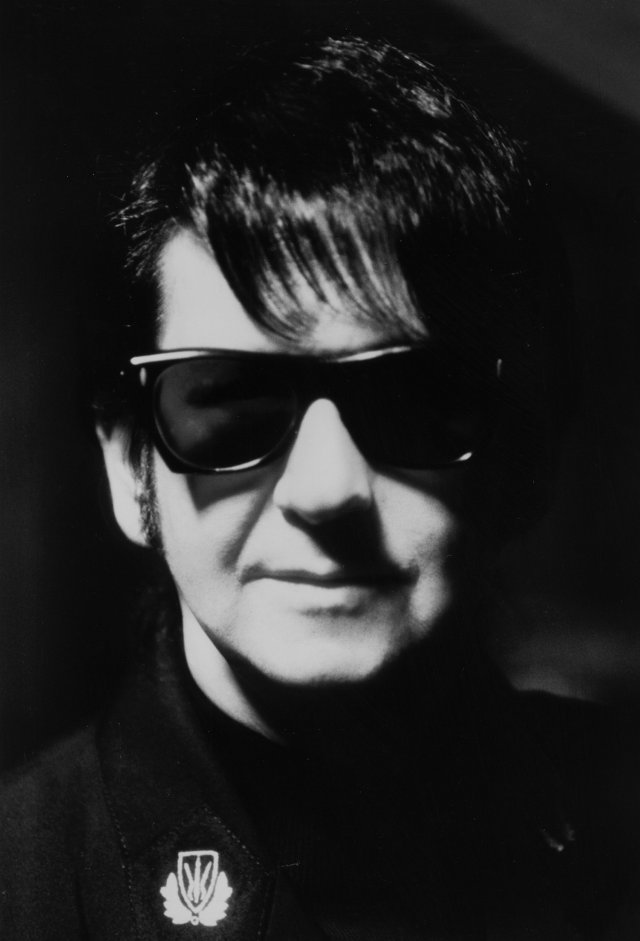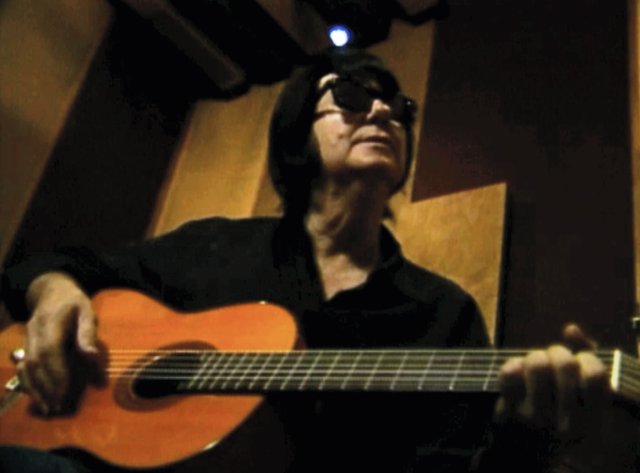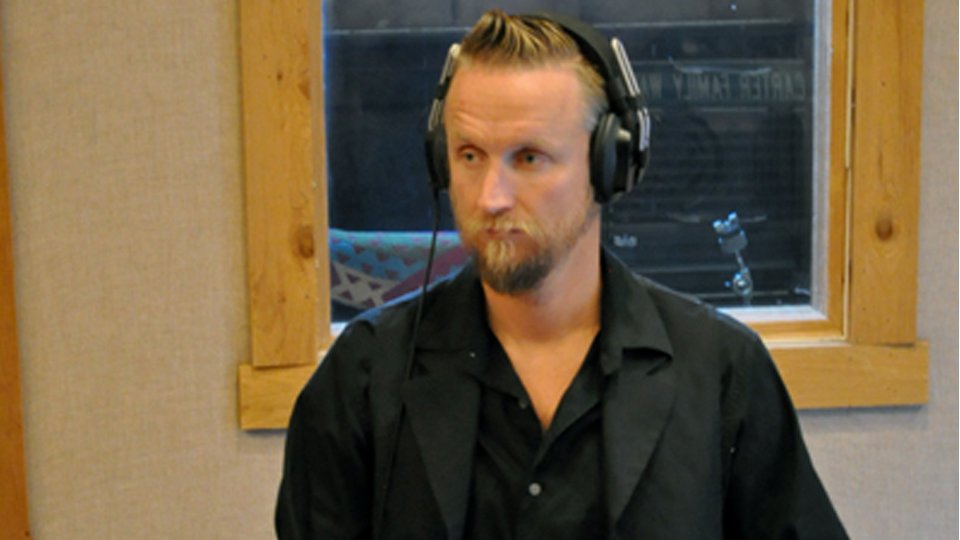The music and songwriting talent of the great Roy Orbison has touched the lives of countless fans across the globe. His heart-breaking ballads, rock ‘n roll magic and outstanding, unique vocal ensure his songs remain timeless classics to this very day.
Thankfully for fans, all the hours of recordings, tours and shows he performed over four decades, until his tragic death at just 52, have now been expertly distilled into the first definitive package of his work, compiled his very own family.
Roy’s Boys LLC, the Nashville-based company founded by his sons to administer their late father’s catalog, has teamed up with Legacy Recordings, the catalog division of Sony Music Entertainment, to release Roy Orbison – The Ultimate Collection.
From the early days at Sun Records, right through to his work with supergroup, Traveling Wilburys, the 26-track package will delight fans with hit after hit (after hit, after hit…).
Roy’s son, Alex Orbison, a successful musician himself, along with brothers, Wesley and Roy Jr, had the job of trawling through music vaults and selecting the tracks that represented their father the best.
Here, I spoke with Alex about this massive undertaking, where his father’s musical genius stemmed from and why it’s so important for the family to maintain and safeguard the extraordinary Roy Orbison legacy.
Why did the family decide to release a definitive collection now and what was your main objective?
It was really to get people to listen to the original albums. For the last several years we’ve been focusing on releasing entire records and getting back to that, but as the format that people listen to music changes, it seems like going back to the records, and my brothers and I are all musicians as well, so we all value the entire album. There’s a bit of a paradox when people see the album or the documentary we do. It’s more of a speciality product, so it makes people want to get the hits package. We had a lot of help in the UK with Sony. It’s been wonderful. We all agreed it was time, and I was really pushing that it was time now, because it’s been a while.
Great, but this release isn’t based around any milestone, anniversary or occasion?
No, no it’s not. This was a good slot. There’s just so much going on and this is the go-to collection. It’s consumer-driven. A lot of people would say with the last collection, that it would be the perfect entry to Roy Orbison, but you would want the original version of the song. So this is the definitive version of the definitive songs, all on a single disc, including as much as we could that would be representative of my Dad’s whole career.

Do you think you have a good feel of how he would want his music represented on a collection, such as this?
Oh yeah. I think I was 13 when my dad passed away, but he was different to most rock stars. He was so accessible and I’m still waiting for someone to tell me my Dad was a jerk to them – it just never happened. The story is always, ‘I waited at the airport and your dad was late to the plane, and he had a fever, but he stopped and talked to me and signed something and took a photo and then went on’. I really did know my dad very well and, if he was here, we’d be working on the next record. If you asked my dad what the best song was he ever wrote, he would say, ‘the next one’.
How did you go about researching what to include – I imagine there are vaults of songs in archives!
Yeah, the good thing is nothing really happens overnight. This has been coming since we started in 2013, releasing the last concert again, and the package that came out in 2014. It usually happens when I can’t sleep and I’m online and I’ll make a list. We’re very democratic about things and everyone submitted what their list would be. I’m listening to stuff constantly.
The other thing is, my dad really was about the songs…the importance of the song for his career, it’s like a house of cards, you know. If you take away Claudette or Ooby Dooby, you never have, Only The Lonely. If you take away one of these songs, literally there is no Roy Orbison. There’s intersections of fate, talent and work…
How involved were you in reproducing the songs and how much work was actually required?
You know, Sony’s a great partner and all the stuff from the sixties, those guys had the tapes, and all the later stuff, we had the tapes. So we literally go down to where we store the music and dig out the tapes and run them off and get them to those guys. We make sure that every step of the way, each little thing looks right, sounds right, or feels right. I’m a bit of a control freak, I guess.
Did you want the listener to experience a certain arc or journey as they go through the collection?
Yeah, a lot of times you want to start at the front, especially sonically, you know, from the mid-50s it has such a different feel. You really have to take your hat off to Vic Anesini for mastering (at Battery Studios in New York). We ended up seeing that a lot of people, who are casual fans, wanted Oh, Pretty Woman right off the front, and I totally understand that. So we wanted to start with a lot of heat and then settle in and that works really well.
Going through the selection process, it must have been be fascinating to see how his work and style changed through the decades…
Whether it was musical style or fashion, or whatever, he had a little bit of nostalgia, but not really with his music – that was mostly with his cars – he was an automobile freak! With the music it was always forward. I always say that Roy Orbison lived life looking through the windshield and not the rear view mirror.
Do you have any idea how many recordings there actually are, or is it completely impossible to tell?
No, if you scoop out the live recordings, which are substantial, then it’s several hundred. Just the MGM-era alone, there’s about 152 songs that have been released, so far. So, when you add them up with everything else, it is crazy, because with my Dad, there’s always more. When I think I have a number, I’ll get a phone call from someone and they’ll say, ‘we just opened a storage bin and we’ve got a bunch of tapes that have your Dad’s name on them’. You know, my Mom passed away in 2011 and I essentially have my own life, I play the drums, and when I came on (to this project) I like to figure out where the parameters are and the edges, and just work in that, and this has been a total roller coaster ride.
Do you find yourself realising something new about your father every time you discover another song?
You know, it’s completely true. How hard this guy worked throughout his life is totally incredible. I looked at the recording logs and then put that next to the touring schedule, then I looked at when the family holidays were and, even when his new records were weren’t selling as much, his tour log through there was just ridiculously incredible. He played so many shows and visited so many countries I heard he was eligible for Guinness World Records. And in the midst of that, he recorded like three or four records, so it was really astounding. For me, I knew my Dad as a little bit older man who was touring vigorously, but he had kind of perfected it into a science – just on the edge of being too much, but not too crazy. That’s one thing I learn every time I go through things, I just think, ‘man, how did this guy do it?’
So what do you think was driving him to keep touring and producing music at such a high rate?
He really did enjoy it and, in a way it’s hard to say, he started at six and by eight he was already on the radio, so it was all that he ever knew. He did do actual manual labour, digging ditches and he painted a water tower, and he wrote a song, Working For The Man, which was a hit for him. But it’s funny, ‘cause he was so old-fashioned and such a gentleman, that the work side of it was to show up, even if he had a cold. I found a tape recently where he was sick and he just apologises, but says, ‘I’m gonna play a good show’. You hear him singing through this cold and people were just screaming the whole time. I know that he felt he had a sense of duty and professionalism, which is hard to keep up.
How do you think he remained so grounded?
He would say his grandmother told him to just stay in the middle. You have these really high highs, like Oh, Pretty Woman, and you chop off the top of the mountain and you put it at the bottom of the valley. Don’t take the ride all the way up, just stay in the middle. But how he did it, I don’t know.

Where do you think his musical genius came from?
It’s my theory that he was going to be involved in music, no matter what. For instance, in the mid-50s Wade Moore and Dick Penner had a song called, Ooby Dooby that they were playing. He saw them and he waited for them on the side, and he could play guitar really well at that time, and he kind of forced himself on that band (he recorded the song himself in the mid-50s).
He played with The Everly Brothers and they said, ‘do you happen to have a bunch of songs for us?’
He said, ‘no, I have one song, and it’s called Claudette”. And so he gave it to them, and that was a huge realisation for him, that maybe he was just going to write songs for people and not be the star. And so whatever way it was going go, he kind of went with it. That rounded him out so well as a musician. The songs were like a ladder for his voice to get that high and it doesn’t happen with other people’s songs, they have to learn the formula that is Roy Orbison, that operatic ballad. The mix of all these things is the only way you can have a reduction and boil it down to what is Roy Orbison. The voice is amazing, but the difference of this guy between 1960 and 1964, in four years he went from where he sounded beautiful, but then there was this thunder that started coming that I don’t think anybody really could have known was there.
What do you think it was about the writing that connected so much with the audience?
Yeah, I’ve studied this a lot and it really is the perspective. He, with the help of his co-writers, puts himself where he’s at the centre of his stories, but he’s not the hero, really. There were these real-life situations that he had obviously lived through somehow, or knew of, but most of them were personal experiences. When it all seems like it’s going to fall apart, sometimes it comes together, sometimes it doesn’t, and I think the perspective of putting himself there, but not as the hero, or whatever, and by having a formula, it keeps you on your toes. A lot of those big crescendos too, it’s almost like watching a horse race, the one with all the odds stacked against it, coming from the back of the pack, three quarters of the way through and everyone’s thinking, ‘can he actually do this?’ And of course he does. That anticipation of that whole moment of watching that happen…
I’ve known people who didn’t understand English, but heard the first Roy Orbison song and knew what he was trying to relay about the records, so it’s a crazy mix.
Roy Orbison has been such a huge inspiration to musicians of the past, present and future. What stories do you hear from artists he has touched with his musical gift?
There is like a reverence. He runs with a very small pack, I guess. When you’re a musician you listen to the songs and dissect them and wonder how all the pieces individually get together to form the whole picture. Even people you would never assume, like I’m friends with Steve Jones, from the Sex Pistols, and I did interviews with him in about ‘86 or ‘87 and the guy asked him what he got from Roy Orbison’s music – trying to catch him off-guard. Steve just rattled off the songs and described why Crying was more impactful than Only The Lonely and how terrifying the ballads were. You see these things and the light bulb goes off. Even people you would almost assume didn’t know, or hadn’t studied Only The Lonely have gotten into it at one time or another.
I kept seeing Bruce Springsteen’s picture through Germany (recently), when I was travelling, and I just thought how many times he had gone the distance to be near or help my dad. There’s the story of him writing in the back of a truck or something from Jersey to Nashville to play a show with my Dad in the 70s. It’s completely amazing.
What does the family have planned next, in regards to the collection and releasing new material?
I’m really excited about the ultimate package. Being able to have Handle With Care (Traveling Wilburys) in the set means a lot to us as a family. I talked to Olivia Harrison (George Harrison’s widow) at length about this and it’s truly nice to be all inclusive at this point. We have so many good projects coming with my Dad, these are good times. There are more things to come in the future. Whatever we have I want to utilise to the fullest and I think the fans understand that, so they can rest easy knowing if there’s anything useable, they’ll have it in the package and our speciality products.
It’s so nice to know that all the music is still in the safe hands of the family, that you’re protecting its legacy and have its best interests at heart…
Yep, and we always say that we’re the super fans with family backstage passes!
The Ultimate Collection was produced by Alex Orbison, Chuck Fleckenstein and John Jackson, and mastered by Vic Anesini at Battery Studios in New York. It was released on 28th October 2016.


